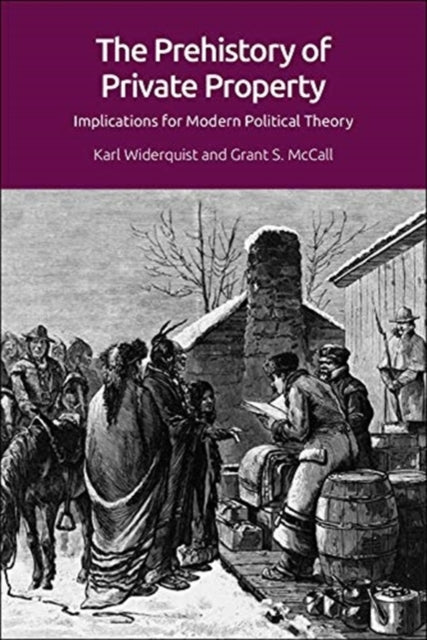Karl Widerquist,Grant McCall
Prehistory of Private Property: Implications for Modern Political Theory
Prehistory of Private Property: Implications for Modern Political Theory
YOU SAVE £24.91
- Condition: Brand new
- UK Delivery times: Usually arrives within 2 - 3 working days
- UK Shipping: Fee starts at £2.39. Subject to product weight & dimension
Bulk ordering. Want 15 or more copies? Get a personalised quote and bigger discounts. Learn more about bulk orders.
Couldn't load pickup availability
- More about Prehistory of Private Property: Implications for Modern Political Theory
The book challenges three false claims about property systems, arguing that inequality is not natural, capitalism is not more consistent with negative freedom, and the normative principles of appropriation and voluntary transfer support a capitalist system with strong, individualist, and unequal private property rights. It refutes these claims with anthropological and historical evidence, showing that societies with common-property systems were initially widespread and that the private property rights system was established through violent state-sponsored aggressions.
Format: Hardback
Length: 272 pages
Publication date: 28 February 2021
Publisher: Edinburgh University Press
This book challenges three widely held beliefs about property systems that are commonly accepted by contemporary political philosophers. These beliefs include the idea that inequality is natural, inevitable, or incompatible with freedom; that capitalism is more consistent with negative freedom than any other economic system; and that the normative principles of appropriation and voluntary transfer support a capitalist system with strong, individualist, and unequal private property rights. The authors conduct a thorough review of the history of these claims in philosophy and use extensive anthropological and historical evidence to refute them. They demonstrate that societies with common-property systems that maintain strong equality and extensive freedom were once prevalent worldwide and that the private property rights system was established through a series of violent state-sponsored aggressions.
The authors begin by examining the claim that inequality is natural, inevitable, or incompatible with freedom. They argue that this belief is based on a narrow understanding of freedom that focuses solely on individual autonomy and ignores the social and economic structures that shape individuals' lives. They point out that inequality is a result of social and economic policies that prioritize the accumulation of wealth and power by a small elite, and that these policies are often supported by the state.
The authors then examine the claim that capitalism is more consistent with negative freedom than any other economic system. They argue that capitalism is based on the exploitation of labor and the accumulation of wealth, which leads to a concentration of power and wealth in the hands of a few individuals. They point out that capitalism has led to widespread poverty, inequality, and environmental degradation, and that it is not sustainable in the long term.
The authors also examine the claim that the normative principles of appropriation and voluntary transfer support a capitalist system with strong, individualist, and unequal private property rights. They argue that these principles are based on a flawed understanding of human nature and that they do not promote social justice or equality. They point out that these principles have been used to justify the exploitation of labor and the accumulation of wealth by a small elite, and that they have led to the concentration of power and wealth in the hands of a few individuals.
The authors provide extensive evidence to support their arguments. They use anthropological and historical evidence to show that societies with common-property systems that maintain strong equality and extensive freedom were once prevalent worldwide. They also use economic data to show that capitalism is not more consistent with negative freedom than any other economic system.
The authors also offer a critique of the current economic system. They argue that the current economic system is based on the exploitation of labor and the accumulation of wealth, and that it is not sustainable in the long term. They propose a new economic system that is based on the principles of social justice and equality.
In conclusion, this book challenges three widely held beliefs about property systems that are commonly accepted by contemporary political philosophers. The authors provide extensive evidence to support their arguments and offer a critique of the current economic system. They argue that inequality is a result of social and economic policies that prioritize the accumulation of wealth and power by a small elite, and that capitalism is not more consistent with negative freedom than any other economic system. They propose a new economic system that is based on the principles of social justice and equality.
Weight: 640g
Dimension: 185 x 240 x 28 (mm)
ISBN-13: 9781474447423
This item can be found in:
UK and International shipping information
UK and International shipping information
UK Delivery and returns information:
- Delivery within 2 - 3 days when ordering in the UK.
- Shipping fee for UK customers from £2.39. Fully tracked shipping service available.
- Returns policy: Return within 30 days of receipt for full refund.
International deliveries:
Shulph Ink now ships to Australia, Belgium, Canada, France, Germany, Ireland, Italy, India, Luxembourg Saudi Arabia, Singapore, Spain, Netherlands, New Zealand, United Arab Emirates, United States of America.
- Delivery times: within 5 - 10 days for international orders.
- Shipping fee: charges vary for overseas orders. Only tracked services are available for most international orders. Some countries have untracked shipping options.
- Customs charges: If ordering to addresses outside the United Kingdom, you may or may not incur additional customs and duties fees during local delivery.


